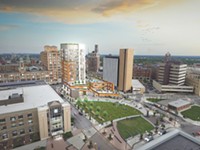Monday, July 14, 2014
Was it a rebellion or a riot? And does it matter?
Posted By Christine Carrie Fien on Mon, Jul 14, 2014 at 3:41 PM
I’ve been mulling over the correspondence I've received from the City of Rochester about upcoming events marking the 50th anniversary of the 1964 race riots.
Except the city doesn't use the word “riot” exclusively. It calls the events of 1964 the “Rochester Rebellion” or the “Rochester Rebellion/riots.”
Does it make a difference? After initially dismissing the idea, I've come to believe that it does. Maybe the terms have been used interchangeably in the past, although I've only ever heard what happened that weekend called a riot.
A “rebellion,” in my opinion, is a more benign term and suggests an uprising against injustice. You can get behind a rebellion — a riot, maybe not so much. Whether or not you agree with the ideas behind the rebellion or the way it’s carried out, there’s a sense that somewhere, an underdog is fighting back against an oppressive power.
Of course, that’s exactly what residents of Rochester’s inner city were doing in 1964: simmering in a hot soup of deplorable housing, lack of jobs, and the obliviousness of people who were in positions to do anything about it, until the whole thing spilled over onto the streets, causing about $1 million in property damage, four deaths, and approximately 800 arrests.
But a rebellion also suggests a coordinated, pre-planned action. And though I wasn't there, what happened in 1964 feels more like an explosion – an episode of mass projectile vomiting in an attempt to alleviate a long-festering sickness.
But you can’t fairly argue that everything done over that weekend was understandable or justified. Hundreds of stores were looted and-or damaged by rioters — rebels? — over that weekend. These were people that were invested in the neighborhoods; who knows how many left the city as a result? And a man was attacked and killed at Clarissa and Atkinson streets.
I’m not saying that there’s a campaign under way to recast or justify the events of 1964; maybe it’s just about recognizing the conditions that lead up to the riots — and that's important because, look around, not much has changed. Blacks in the inner city still struggle with joblessness and poor housing conditions, not to mention broken schools, violence, the scourge of drugs, and more.
Except the city doesn't use the word “riot” exclusively. It calls the events of 1964 the “Rochester Rebellion” or the “Rochester Rebellion/riots.”
Does it make a difference? After initially dismissing the idea, I've come to believe that it does. Maybe the terms have been used interchangeably in the past, although I've only ever heard what happened that weekend called a riot.
A “rebellion,” in my opinion, is a more benign term and suggests an uprising against injustice. You can get behind a rebellion — a riot, maybe not so much. Whether or not you agree with the ideas behind the rebellion or the way it’s carried out, there’s a sense that somewhere, an underdog is fighting back against an oppressive power.
Of course, that’s exactly what residents of Rochester’s inner city were doing in 1964: simmering in a hot soup of deplorable housing, lack of jobs, and the obliviousness of people who were in positions to do anything about it, until the whole thing spilled over onto the streets, causing about $1 million in property damage, four deaths, and approximately 800 arrests.
But a rebellion also suggests a coordinated, pre-planned action. And though I wasn't there, what happened in 1964 feels more like an explosion – an episode of mass projectile vomiting in an attempt to alleviate a long-festering sickness.
But you can’t fairly argue that everything done over that weekend was understandable or justified. Hundreds of stores were looted and-or damaged by rioters — rebels? — over that weekend. These were people that were invested in the neighborhoods; who knows how many left the city as a result? And a man was attacked and killed at Clarissa and Atkinson streets.
I’m not saying that there’s a campaign under way to recast or justify the events of 1964; maybe it’s just about recognizing the conditions that lead up to the riots — and that's important because, look around, not much has changed. Blacks in the inner city still struggle with joblessness and poor housing conditions, not to mention broken schools, violence, the scourge of drugs, and more.
Latest in News Blog
More by Christine Carrie Fien
-

Building up
Mar 29, 2017 -

Hetsko's heart
Mar 15, 2017 -

Squeezing starts at GateHouse-owned Daily Record and RBJ
Feb 28, 2017 - More »

